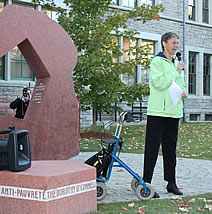Act Now

Empower U: Learn to Access Your Disability Rights Training on Canadian Human Rights, the Convention on the Rights of Persons with Disabilities (CRPD) and its Optional Protocol (OP) training aims to increase awareness of how to address discrimination using more familiar Canadian human rights laws such as Human Rights Codes and the newer international Convention on the Rights of Persons with Disabilities (CRPD). This is training for persons with disabilities by persons with disabilities. The training is part of a project funded by Employment and Social Development Canada and implemented by the Council of Canadians with Disabilities (CCD) in collaboration with Canadian Multicultural Disability Centre Inc. (CMDCI), Citizens With Disabilities – Ontario (CWDO), Manitoba League of Persons with Disabilities (MLPD) and National Educational Association of Disabled Students (NEADS). Read more.
Sign Up for our monthly digest
A monthly newsletter from CCD about what is happening in the community
CCD Calls for Commitments to Remedy Discrimination against Blind Voters
Related Documents
September 17, 2021
What Are Canada's Political Parties Plans Concerning Inclusive Emergency Preparedness?
September 15, 2021
CCD Seeking an Accessible and Inclusive Post-COVID-19 World: No New Barriers!
September 13, 2021
CCD Seeks Commitments on Accessible and Affordable Housing
For Immediate Release | September 3, 2021
Some blind Canadians are dismayed that once again they are experiencing discrimination as they attempt to cast their ballot in the Federal Election. Due to the pandemic, there are voters who want to vote by mail. For blind voters, for whom print is a barrier, the mail-in Special Ballot, which is a printed paper ballot, is proving problematic; because it must be filled in according to the exact specifications of Elections Canada. To verify that the mail-in ballot is completed correctly, the blind voter needs the assistance of a sighted person. The inaccessible Special Ballot robs blind voters of the right to vote in secret, which is a key principle of democracy.
In addition to obstacles contained in the mail-in Special Ballot, blind electors are also encountering barriers when seeking to register online for the mail-in ballot. Some blind Canadians have reported that the requirement to upload scanned identification documents required assistance from a sighted person.
“We have been hearing that the mail-in ballot process is not one that can be negotiated independently by all blind voters,” states Heather Walkus, CCD 1st Vice Chair. “As this election follows the passage of the Accessible Canada Act, which promised no new barriers, this is all very disappointing. Blind voters were expecting to finally exercise their franchise in secret this election the same as other voters.”
At advance polls, Braille information about candidates seeking election is not available for voters who require information in that format. Braille users must rely on other people to give them the correct information.
The barriers to independent secret balloting by blind voters are not new. The disability community has been recommending solutions to Members of Parliament for many years. Canada needs to amend the Canada Elections Act to allow for voting by means other than the paper ballot. Other jurisdictions have successfully expanded voting options by adding accessible voting machines and electronic voting. “We are not seeking an end to the paper ballot, but the addition of accessible voting options so that all voters can exercise their franchise independently and in secret,” states Heather Walkus.
The Council of Canadians with Disabilities (CCD), a national human rights organization of people with disabilities working for an accessible and inclusive Canada, is seeking commitments from all parties to remedy by the next Federal Election the discriminatory obstacles that make it impossible for blind voters to vote in secret and independently verify that their ballot is completed correctly.
-30-
For More Information Contact:
Jewelles Smith, Communications and Government Relations Coordinator, jewelles@ccdonline.ca
Heather Walkus, 1st Vice Chair, heather@ccdonline.ca
About CCD
CCD is a national human rights organization of people with disabilities working for an inclusive and accessible Canada.
Mission
The Council of Canadians with Disabilities (CCD) is a social justice organization of people with all disabilities that champions the voices of people with disabilities, advocating an inclusive and accessible Canada, where people with disabilities have full realization of their human rights, as described in the UN Convention on the Rights of Persons with Disabilities.
Mandate
The Council of Canadians with Disabilities (CCD) unites advocacy organizations of people with disabilities to defend and extend human rights for persons with disabilities through public education, advocacy, intervention in litigation, research, consultation and partnerships. CCD amplifies the expertise of our partners by acting as a convening body and consensus builder.

Marie White, a former Chairperson of CCD, addresses anti-poverty rally.
